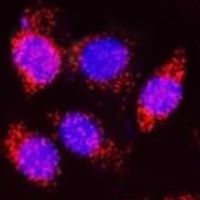Human BNIP3 Antibody Summary
Gly2-Ser160
Accession # Q12983
Applications
Please Note: Optimal dilutions should be determined by each laboratory for each application. General Protocols are available in the Technical Information section on our website.
Scientific Data
 View Larger
View Larger
Detection of Human BNIP3 by Western Blot. Western blot shows lysates of MCF-7 human breast cancer cell line untreated (-) or treated (+) with CoCl2.PVDF membrane was probed with 0.5 µg/mL of Mouse Anti-Human BNIP3 Polyclonal Antibody (Catalog # MAB41471) followed by HRP-conjugated Anti-Mouse IgG Secondary Antibody (Catalog # HAF018). Specific bands were detected for BNIP3 at approximately 25-30 kDa (as indicated). This experiment was conducted under reducing conditions and using Immunoblot Buffer Group 1.
 View Larger
View Larger
BNIP3 in HeLa Human Cell Line. BNIP3 was detected in immersion fixed HeLa human cervical epithelial carcinoma cell line using Mouse Anti-Human BNIP3 Polyclonal Antibody (Catalog # MAB41471) at 8 µg/mL for 3 hours at room temperature. Cells were stained using the NorthernLights™ 557-conjugated Anti-Mouse IgG Secondary Antibody (red; Catalog # NL007) and counterstained with DAPI (blue). Specific staining was localized to cytoplasm. View our protocol for Fluorescent ICC Staining of Cells on Coverslips.
Reconstitution Calculator
Preparation and Storage
- 12 months from date of receipt, -20 to -70 °C as supplied.
- 1 month, 2 to 8 °C under sterile conditions after reconstitution.
- 6 months, -20 to -70 °C under sterile conditions after reconstitution.
Background: BNIP3
Bcl-2/adenovirus E1B 19 kDa protein-interacting protein 3 (BNIP3), also known as 19 kDa interacting protein 3 (NIP3), is a proapoptotic member of Bcl-2 protein family. BNIP3 is a 194 amino acid, 21.5 kDa (predicted) protein that contains a single Bcl-2 homology 3 (BH3) domain and a C-terminal transmembrane domain required for mitochondrial localization, homodimerization, and regulation of its proapoptotic function. BNIP3 was identified as one of several proteins that interact with discrete domains of Bcl-2 and the E1B 19 kDa protein. Under conditions of prolonged oxygen deprivation, the hypoxia-induced protein HIF1-alpha activates expression of BNIP3, which in turn, promotes apoptosis under these conditions. The mechanism of BNIP3-mediated apoptosis is independent of caspase activation and cytochrome c release and is characterized by early plasma membrane and mitochondrial damage, prior to the appearance of chromatin condensation or DNA fragmentation. Human BNIP3 shares 90% amino acid identity with mouse and rat BNIP3. Human BNIP3 shares 56% amino acid sequence identity with human BNIP3L.
Product Datasheets
FAQs
No product specific FAQs exist for this product, however you may
View all Antibody FAQsReviews for Human BNIP3 Antibody
Average Rating: 5 (Based on 1 Review)
Have you used Human BNIP3 Antibody?
Submit a review and receive an Amazon gift card.
$25/€18/£15/$25CAN/¥75 Yuan/¥2500 Yen for a review with an image
$10/€7/£6/$10 CAD/¥70 Yuan/¥1110 Yen for a review without an image
Filter by:


